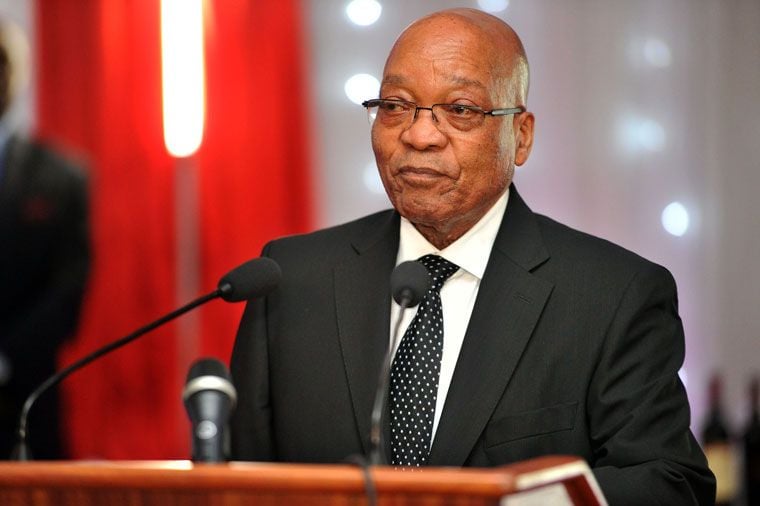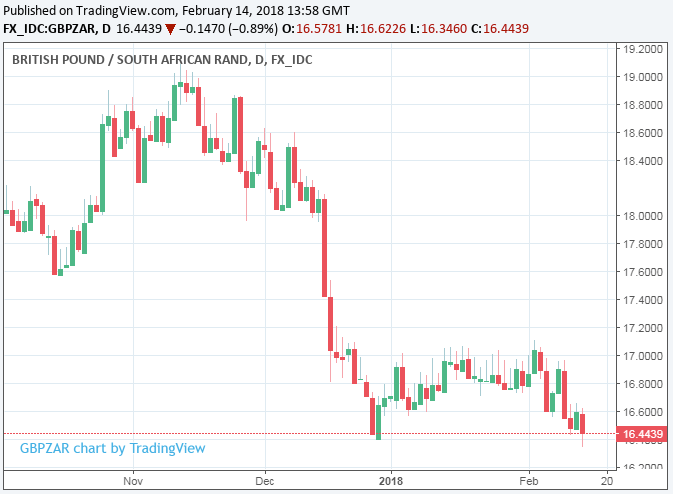South African Rand Surges as Markets Serenade Looming Fall of President Zuma
- Written by: James Skinner

© GCIS, Government of South Africa
As the ANC moves for a no confidence vote in parliament, President Jacob Zuma is playing for a July departure. That may be too long for markets, and ratings agencies, to wait. Further updates to come.
South Africa’s Rand surged Wednesday after senior officials in the African National Congress said they will move ahead Thursday with a no confidence vote in parliament, in order to force the embattled President Jacob Zuma from office.
Dogged by corruption allegations and a dire performance as steward of the South African economy, Zuma has been under mounting pressure to resign and clear the deck for his successor Cyril Ramaphosa to pursue economic and political reforms.
The ANC’s parliamentary caucus said Wednesday that it will act on the ANC national executive committee's request for a vote of no confidence after a letter of recall failed to yield President Zuma’s resignation on Tuesday.
#Mthembu The ANC has recalled President Zuma. The caucus is acting on basis on this recall, if there was another way would have done that, we will into it in the future. #CaucusBriefing
— ANC Parliament (@ANCParliament) February 14, 2018
#Mashatile The most pressing thing is to get ANC President Ramaphosa to be elected as the President of the country. #CaucusBriefing
— ANC Parliament (@ANCParliament) February 14, 2018
Wednesday's statement has given financial markets their strongest hint yet of an eagerly anticipated end to Zuma’s tenure as President, even as the incumbent took to the airwaves to express his indignancy and protest attempts to oust him.
“People should know now that I should resign after June..I need in the [Brics] July summit to introduce you because the perception of the continent is distorted,” President Zuma told national broadcaster SABC, in an apparent effort to play for time.
President Zuma also appealed to party political interests, telling SABC the ruling ANC party is too divided to whether a change of leadership at present and that a show of unity is needed before the Mahlamba Ndlopfu can change hands. A further statement from President Zuma is expected later on Wednesday.

Above: Pound-to-Rand rate shown at hourly intervals.
The USD/ZAR rate fell more than 1% to a new three year low of 11.78 while the Pound-to-Rand rate slid 1.18% to 16.40. Broadly speaking, South Africa’s Rand rose by more than 1% against a solid majority of its international rivals.
South Africa’s Rand has risen by a double digit numbers against the US Dollar and other rivals in the last three months, ever since the reformist Cyril Ramaphosa won December’s ANC party leadership election.
"The market is losing some of its implied certainties. With the risk of a longer arm wrestling between Zuma and the ANC, investors will want to unwind longs and see more clarity in the political road map," says Christian Maggio, head of emerging markets strategy at TD Securities.
"ZAR and South African government bonds can adjust weaker from here, but there are still chances to see them both rally."
Markets have been betting a change of leadership would enable South Africa to avoid a downgrade of its local currency debt rating, by Moody's, in March and that it would pave the way for a series of pro-growth reforms.
The agency put South Africa “on review for downgrade” back in November, citing a rising budget deficit, a deteriorating growth and fiscal revenue outlook, as well as the government’s poor record on economic policy. Governance of state owned enterprises was also an issue too.
It noted at the time, the then-looming ANC leadership election and the forthcoming February budget statement from the Treasury which, if played right, were both cards that could see a downgrade averted.
South Africa’s Treasury must use its February 21 budget statement to set out a credible plan for reducing the budget deficit which, after topping 4% of GDP in 2017, is threatening the country’s investment grade credit rating.
"Fiscal measures should be accompanied by growth-enhancing reforms to help debt consolidation. This would avert our base case of a downgrade of the local currency debt by Moody's," says Ferhan Salman, head of Turkey and South Africa Economics at Bank of America Merrill Lynch, in a recent note.
"Prior budgets fell short of delivering fiscal consolidation as they lacked structural reform."
The incumbent Zuma is seen as the least likely to push through sufficient enough reforms to bring down the deficit whereas the ANC’s new leader, Cyril Ramaphosa, has already shown an appetite for improving governance in South Africa.
A loss of investment grade status could be devastating as it would see many institutional investors forced into selling their government bonds. This would push South African borrowing costs higher and put downward pressure on the Rand once again as foreign investors flee the country.
Advertisement
Get up to 5% more foreign exchange by using a specialist provider to get closer to the real market rate and avoid the gaping spreads charged by your bank when providing currency. Learn more here.




